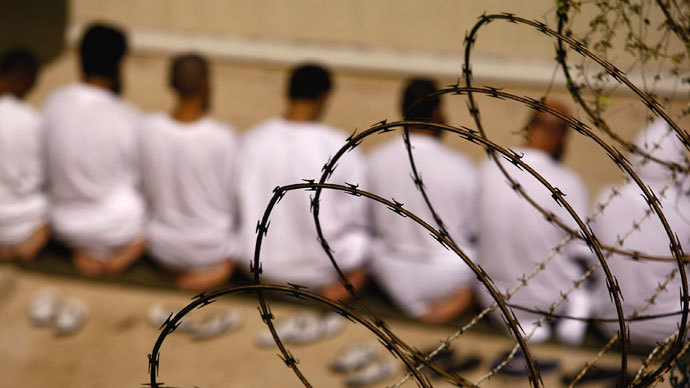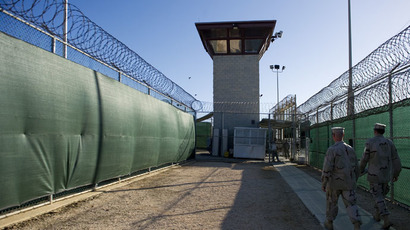Guantanamo force-feedings to be synchronized with Ramadan fasting schedule

While a mass hunger strike continues at Guantanamo, a spokesperson for the American prison camp has confirmed that the upcoming monthlong fast for Ramadan will be observed by synchronizing the force-feeding of Muslim inmates.
Navy Capt. Robert Durand has stated that the facility is
sufficiently equipped to synchronize the force-feeding of inmates
to the Ramadan fast schedule. Captain Durand’s comments were
reported by the Miami Herald, while also noting that this will be
the twelfth Ramadan, a central religious holiday included among
the Five Pillars of Islam, spent in American captivity for most
Guantánamo detainees.
“We understand that observing
the daytime fast and taking nothing by mouth or vein is an
essential component of Muslim observance of Ramadan,”
Durand said.
“And for those detainees on
hunger strike we will ensure that our preservation of life
through enteral feeding does not violate the tenets of their
faith.”
Durand went on to explain that those detainees not currently on
hunger strike will have their meals scheduled accordingly. The
prison has already “laid in
supplies of lamb, dates and honey and zamzam water” —
water from a well in Mecca, according to Durand. The fast will
begin at the US prison camp this year at sunset on Monday, July 8
and end on Wednesday, August 7.
Despite moves to observe the Muslim traditions of inmates at
Guantanamo, lawyers representing detainees as well as the
advocacy group Council on American-Islamic Relations continue to
argue that the practice of force-feeding is inhumane.

As of Tuesday, officials had reported that 106 detainees are
still being tracked as hunger strikers, with 45 of those on the
enteral feed list, meaning they are force-fed through tubes.
On Monday, lawyers representing four Guantanamo detainees filed a
motion with the US district court in Washington, DC to end the
force-feedings. Affidavits by those prisoners stated that they
understood the dangers of hunger striking, and did so voluntarily
in protest of their continued incarceration.
Durand’s comments seemed to be prompted by the legal motion, as
it had questioned the ability of staff at the detention center to
cope with the observance of fasting.
Both lawyers and inmates had written in their complaint that
“because dozens of Guantanamo
Bay detainees are currently being force-fed, it might very well
prove to be logistically infeasible to conduct twice-daily
force-feedings only at nighttime.”
“Petitioners therefore ask this
Court, at a minimum, to enjoin any force-feeding between sunup
and sundown during the month of Ramadan.”
Though this may be the twelfth year for some inmates observing
Ramadan at Guantanamo, the situation this year has been
drastically altered by the large scale of the hunger strike, as
well as the mandatory force-feedings.
In response to the worsening situation the US Navy assigned 40
additional nurses and medical specialists in late April to cope
with larger numbers of hunger strikers since the movement began
in February.
In June, the US Southern Command also requested additional guards
for the prison, with a goal of reaching a 2,000-strong staff to
deal with the 166 inmates, with the hunger strike leaving most
prisoners under single-cell lockdown.
Forty-six-year-old Shaker Aamer, from London, who has been held
at the prison camp without charge for over 11 years, recently
confirmed to The Guardian newspaper that prison staff are
intensifying efforts to try and break hunger strikes by
introducing new equipment.
One detainee was recently admitted to hospital after having the
feeding tube pushed into his lungs rather than his stomach.
“The administration is getting
ever more angry and doing everything they can to break our hunger
strike. Honestly, I wish I was dead,” Aamer said from the
camp.
Aamer also alleged that nurses at the prison are discarding their
name tags prior to entering the camp so as not to be identified
by prisoners, who could potentially file complaints against them.














